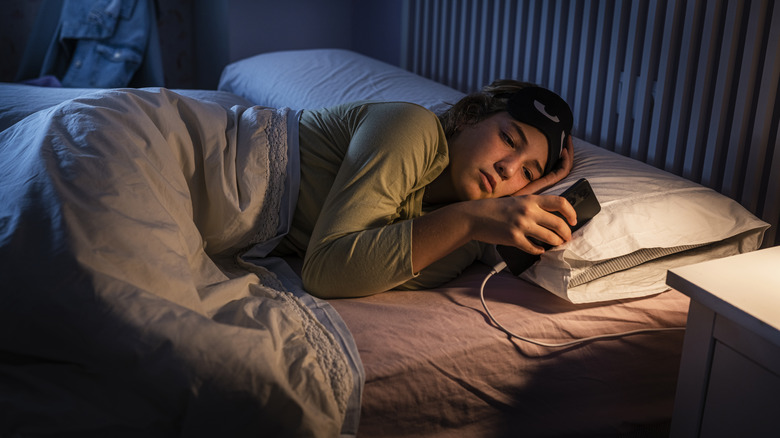When You Go To Bed Late, This Is What Happens To Your Blood Pressure
You probably know from experience that when you go to bed late, you often wake up feeling unrefreshed the next morning compared with how rested you feel when you keep to regular sleep times. This is mostly because going to sleep later than usual doesn't necessarily mean that you can snooze for longer in the morning. Work usually starts at the same time and you still have to be out of bed with enough time to get ready. Staying up late invariably means fewer hours spent asleep.
According to a 2023 study published in Hypertension, postponing your sleep time can have an even bigger consequence on your health — particularly, a surprising effect on your blood pressure, as it can raise your risk of high blood pressure. This remained true even if someone were to get their recommended hours of sleep after going to bed late.
"This indicates that people may need to consider not only how long they sleep, but also recognize the importance of keeping a regular sleep schedule for optimal cardiovascular health," shared Danny Eckert, senior study author and director of the Adelaide Institute for Sleep Health, who is also a professor in the College of Medicine and Public Health at Flinders University in Adelaide, Australia (via the American Heart Association). Let's take a closer look.
The connection between late bedtimes and high blood pressure
In the 2023 study, the data was focused on a nine-month period encompassing over 12,000 adults, predominantly middle-aged men who were overweight, with and without high blood pressure, from 20 countries. A 34-minute delay in getting to bed increased the participants' risk of high blood pressure by 32%, while a 90-minute delay or longer saw a 92% increased risk.
While science isn't entirely sure how postponing sleep times can cause a spike in blood pressure, there are a few theories as to why this may happen. As explained by Dr. Clete Kushida, chief and medical director at the Stanford Division of Sleep Medicine, it could be connected to disruptions in your circadian rhythm (via Health). Maintaining a regular sleep schedule ensures you wake up at roughly the same time every day and get sleepy at roughly the same time every night. This not only ensures that you get the recommended hours of sleep every night but also keeps your body's internal 24-hour clock (your circadian cycle) fairly consistent. Your circadian cycle also influences things like appetite, hormone release, etc. Not being able to regulate blood pressure could also be one of the side effects of disruptions to this clock, per Dr. Kushida.
This also explains why night shift workers who experience circadian rhythm misalignment are more prone to having high blood pressure. A higher risk of elevated blood pressure was also observed in a selection of 2,000 Mexican adolescents who had bedtimes at 11 p.m. or later, per a 2020 study published in the American Journal of Hypertension.
Other reasons why going to bed late may lead to high blood pressure
Another side effect of not going to bed at the same time every day has to do with not getting enough sleep, although this wasn't a factor that influenced high blood pressure risk in the 2023 study.
Inadequate sleep can cause fluctuations in your hormones, which can in turn cause spikes in blood pressure, per cardiologist Dr. Francisco Lopez-Jimenez (via Mayo Clinic). "It's thought that sleep helps the body control hormones needed to control stress and metabolism. Over time, a lack of sleep could cause swings in hormones. Hormone changes can lead to high blood pressure and other risk factors for heart disease," explained the physician.
The takeaway, it would seem, is to keep to a consistent sleep schedule for several reasons. When you go to bed at the same time every night (and yes, weekends included) and wake up at the same time every day, you are, by default, getting your recommended hours of sleep. For adults, this is between 7 and 9 hours. Additionally, you're making sure you're in a good mood, your stress levels are low, your circadian rhythm is well-aligned, your cognitive function is at its peak, and your immune system is functioning at optimum performance. All these factors contribute to your overall health, not just your heart health.
Speaking of heart health and blood pressure, though, you should read up about what happens to your blood pressure when you wake up frequently at night.


